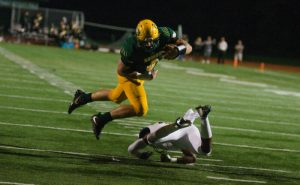Seasonal sounds: RBHS fine arts department to hold winter concerts Dec. 13, 14, 16
December 11, 2021
The RBHS fine arts department has been working diligently since their opening concerts earlier this fall, with the various sections all preparing for their upcoming winter concerts. The bands, orchestras and choirs are to hold their performances in the Performing Arts Center Dec. 13, 14 and 16, respectively.
The music-filled week is kicking off on Monday with the RBHS bands, conducted by Director of Bands Patrick Sullivan and Associate Director of Bands Eric Spaeth, in a joint Band Winter Concert with the Jefferson, John Warner and Ann Hawkins Gentry Middle School bands. Concert band is the first RBHS performance of the night at 6 p.m. with symphonic band and wind symphony following after at 7 p.m. and 8 p.m..
With a mix of winter-themed works and more technical songs making up the current concert pieces, senior Tivon Straub said he has enjoyed getting to play seasonal songs as the holidays approach.
“One of the pieces that we’re playing is called ‘Minor Alterations,’ and that one’s really cool because it takes a bunch of Christmas songs and [puts] them in minor keys, so it’s just like a fun, festive piece, and it’s fun to make usually easy music challenging again,” Straub said. “You’ve got ‘Jingle Bells,’ ‘Oh Christmas Tree’ and all your other basic Christmas songs [in the arrangement]. It’s just basically a lot of fun. The other three [pieces in the concert program] aren’t winter-related, though.”
Straub described learning new music in the two months between concerts as a multi-step process. He said it starts with getting the basic idea of the piece, and then slowly combining in the various aspects of performing that creates more elevated music playing.
“Usually, the first thing we do when we get music is we spend time sight-reading it. After that, we’ll play through it once and we’ll identify the sections that need a lot of work and pretty much every other day, except about two days before the concert [where] we’ll just spend time playing over little sections,” Straub said. “A lot of the things we do in class is working on intonation, and then [aspects] like getting the notes and stuff down is more like what [Sullivan] wants us to get done outside of class, so we spent a lot of time [in class] working together [as a whole band].”
The next concert of the week belongs to the concert and chamber orchestras on Tuesday, headed by Alison Lankheit, the Orchestra Director. Concert orchestra is scheduled to play first at 7 p.m. with chamber orchestra performing directly after.
Similar to the concert programs of the bands, chamber orchestra has an assortment of festive and technique-heavy music, with the two holiday pieces “Have Yourself a Merry Little Christmas” and “All I Want For Christmas Is You,” as well as three other songs ranging from a Baroque piece by Vivaldi and J.S. Bach to an arrangement from the “Munich” soundtrack. Lankheit said the selection process for new music each cycle depends on a variety of factors.
“When I pick music, I try to figure out a balance between what’s going to be interesting, but also something that’s challenging enough that we can maybe learn something new, but not so challenging that it’s just impossible,” Lankheit said. “This semester, for this concert, I picked pieces that were slightly easier than normal because we did not have as much prep time for this concert. That can [also] be kind of a challenge though just because we start to overplay things [when] maybe [the music] gets to be too easy.”
Lankheit said the usual process for learning to play new music as an orchestra consists of sight-reading and discussing important details of the music first, like key and time signatures. Once the orchestra builds a foundation for playing the music, the rest of rehearsal time goes into working on specific “problem areas” to get a piece sounding as polished as possible before the performance. Even with a relatively easier program than normal, Lankheit said there are still features of the music harder to get down than others.
“I mean, obviously [what’s most difficult] varies between pieces. I feel like making sure that we stay within the key of the piece can be a challenge, especially if we have a piece where we’re playing something with four sharps, which is more than we’re usually playing,” Lankheit said. “I would say rhythm happens to be more of a problem than anything else because we always want to get them down. I always like to fix the rhythms first, before we fix the pitch.”
The three choir performances start at 7 p.m. Thursday by the concert choir, advanced treble chorus and chamber choir, conducted by Vocal Music Director Mike Pierson. They will be closing out the department’s winter concerts with a selection of acapella songs and an arrangement of “Jingle Bells,” a combined piece performed by all of the choirs.
Junior Sunday Crane, a member of chamber choir, said the progression of learning to sing a new piece starts with learning the rhythms, then the pitch and melody and finally adding in the words and pronunciation.
“We usually start with the notes, especially on languages that are really hard. Because if you start with [learning] the foreign language, it all just gets too hard and we kind of forget how to sing,” Crane said. “So, with all of our pieces, I think we kind of start with uniform vowel sounds, usually “ou” or “lu,” and then [we go] through with pronunciation.”
Crane said as a general rule, music is first introduced to the entire choir to go over main themes and repeated passages. The different then sections split off into practice rooms to work on their individual parts.
With Russian songs like “Skylark” that required the help from University of Missouri— Columbia professors for pronunciation, or pieces like “O Magnum Mysterium,” which is a fugue, chant-like song, Crane has never sung before, she said each program brings new opportunities for improvement. When students are able to bring all learned onto the stage in front of a live audience, however, Crane said it brings in an entirely new level of growth.
“I’d say you never really know what you’re going to sound like in front of a crowd until you go out and perform as a choir. Even if [when] we rehearse [we’re] completely uniform, our first concert is almost always our worst one,” Crane said. “Just knowing the people that you’re going to perform with and getting that experience to blend [is important because] so much of choir is about listening to each other. I’ve found that I think I become a better singer every time I have a concert and that has something to do with the presence of the audience.”
Lankheit, like Crane, shared sentiments about the benefits of performing in front of others. She said concerts create chances to exhibit soloists and section leaders, and those are experiences that can make her students stronger players and musicians.
“There’s so many, so many things to learn [from performing in front of an audience], and it’s kind of hard to put it [into] words. Just knowing that you’re creating something that brings people joy and [that] you’re part of this process of making art, I think the feeling of that is unlike many things,” Lankheit said. “If you’re creating art and then having your family watch you, for them to get to see your accomplishments, it’s hard to put that in words, but it’s just this feeling of joy, happiness and excitement and pride and all those things. […] It’s this unique opportunity and privilege that we have in orchestra.”
At the end of the day, concerts provide an opportunity for the fine arts department to share what they have accomplished and receive recognition for their work, and Straub said he believes that is why concerts are so important to the department.
“I mean when you [play] music, part of the reason we do it is so that people can actually hear it. It gets boring to forever keep practicing and practicing without ever getting appreciated,” Straub said. “I think the biggest thing that concerts do is allow us to actually have someone listen to us play. I know that sounds silly, but I always feel good after we all stand up at the end to bow, and I’m always proud of what we put on for others to see.”
Will you be attending the winter concerts? Let us known in the comments below.



















































































